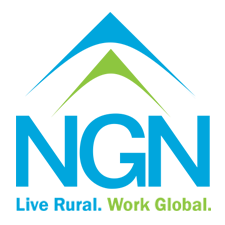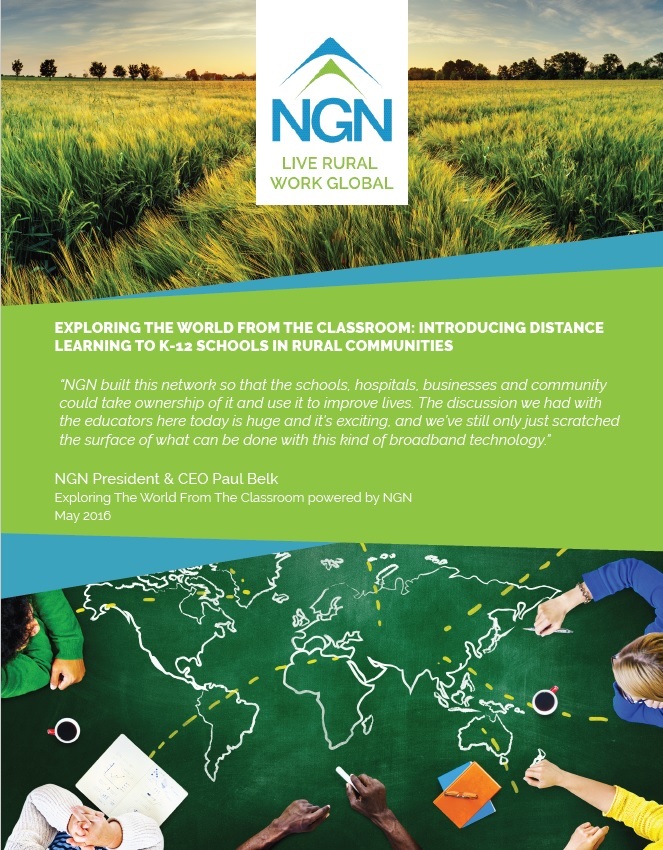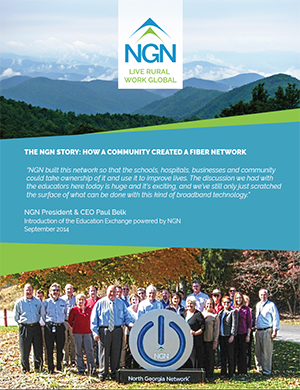The launch of the Education Exchange Network provides 10Gb connection for all North Georgia schools.
Habersham recently celebrated the 75 year anniversary of the electrification of the county and leaders from NGN and Georgia Communications Cooperative just announced a new initiative they think will have as large an impact as electricity on the region.
More than 100 educators and supporters from all across north Georgia came together at the ETC pavillion on the banks of the Ellijay River to witness the birth of a partnership that will expand educational opportunities across our state. Together NGN, ETC Communications, and Parker Fibernet signed an agreement to launch the Education Exchange: a 10-Gigabit, 3,600 mile fiber optic network connecting every county from the western to the eastern state borders of North Georgia. This interconnected network can potentially connect 330 public and private schools, allowing unprecedented collaboration, shared resources, and expanded curriculum.
Michael Foor, President of Georgia Communications Cooperative (GCC) served as the emcee for the event.
“This launch will completely transform our communities,” said Foor, “providing support to expand the horizons, the dreams, and the reach of north Georgia students far beyond the Blue Ridge mountains – making anything obtainable for generations to come.”
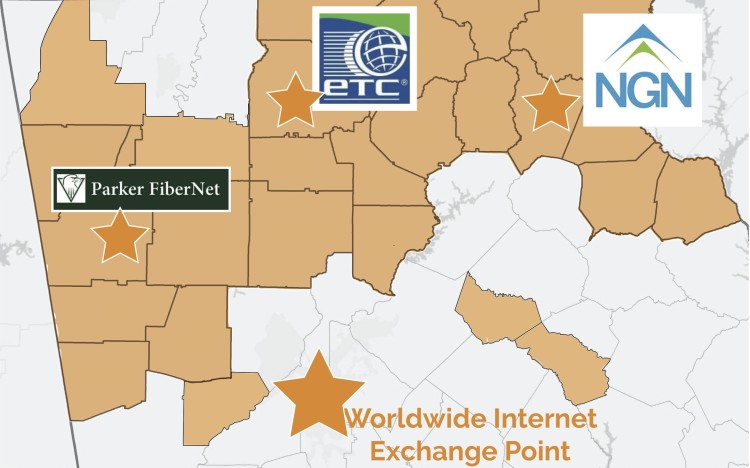 The Education Exchange will be governed by the schools themselves who will decide what resources are shared between regional school systems on their network. The three network providers supporting the program will provide the 10-gigabit connection between the schools, which offers virtually unlimited access to shared educational information.
The Education Exchange will be governed by the schools themselves who will decide what resources are shared between regional school systems on their network. The three network providers supporting the program will provide the 10-gigabit connection between the schools, which offers virtually unlimited access to shared educational information.
But, what will shared access mean practically? It could mean shared use of teleconferencing systems between school systems, lowering expenses for each system or school. It could even mean hosted phone systems and elimination of additional vendors, freeing tight budgets to focus more on student and teacher resources.
Additionally, the bandwidth and speed means that teachers can take advantage of real-time video conferencing to bring powerful educational resources from other schools, higher education labs, or professionals.
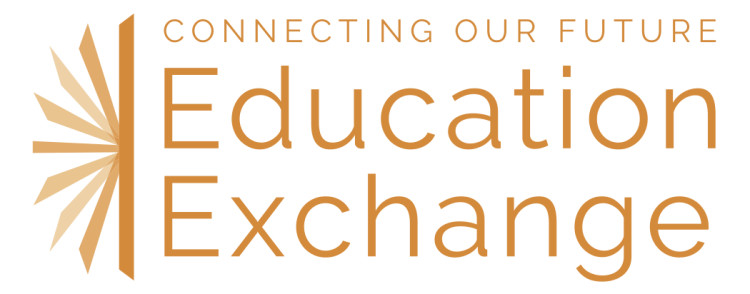 Schools are the largest and most resourceful users of the Internet, and educational software applications, which can be shared on the Education Exchange, are growing exponentially.As additional schools join with the NGN beta schools, the network will provide access to additional instructional content, teachers, books and information in a way this area has never seen.
Schools are the largest and most resourceful users of the Internet, and educational software applications, which can be shared on the Education Exchange, are growing exponentially.As additional schools join with the NGN beta schools, the network will provide access to additional instructional content, teachers, books and information in a way this area has never seen.
“The strength of our communities, our economy, or workforce… it all starts in the schools,” said Paul Belk, NGN visionary and CEO, “connecting schools through the powerful network highway is the first step. Now we are putting schools, administrators, teachers, and students themselves in the driver’s seat,” charged Belk.
Education Exchange Expands Rural Opportunities.
By making high-speed broadband services available to some of the most disconnected and rural areas of north Georgia, NGN and our partners are intending to drastically impact the way our children learn in today’s schools. With these additional educational and technological resources, we believe that opportunity for economic growth increase noticeably through jobs and infrastructure.
It’s more than just keeping up. According to David Parker, CEO of Parker FiberNet, the Education Exchange member schools will experience connectivity that surpasses that of Atlanta, Chicago, or Washington, DC. “Students can connect faster, they have better connectivity, and they can still live and work in their communities,” Parker said.
Imagining Georgia without these technology resources means imagining Georgia without jobs.
During a particularly poignant moment in the day’s fanfare, were thoughts of reflection from Bruce Abraham, an advisor to NGN since its very inception more than four years ago: “The scariest thing about building this network was what we would have lost if we didn’t build it.”
He proceeded to explain how the expansion of the Education Exchange means that we can keep locals local yet connected and our communities can grow and thrive. Companies can move into the area and expect a more educated workforce with resources that rival that of American urban meccas, but with the higher quality of life and lower cost of living. Rural Georgians can imagine their children’s future brighter than their own.
“The leadership of tomorrow would not be in this community, the opportunities would have gone somewhere else.” said Abraham.
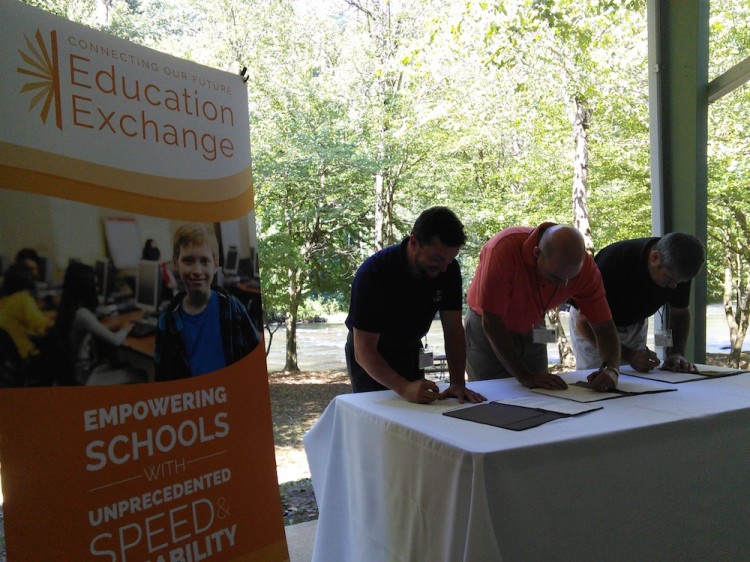
The launch was closed by the official signing of the Education Exchange agreement between Paul Belk, President and CEO of NGN, Jason Smith, VP of Business Development at ETC Communications, and David Parker, President of Parker FiberNet.
This marks the beginning of a new era in Georgia. One that is self-sustaining, one that is ever growing, and ever expanding, enriching the lives of children, students, and communities across Georgia.
“Here’s the path. We want you to walk with us.”
NGN challenges all school students, teachers, and administrators to think about the kinds of content and applications you want to see on the Education Exchange.
Additional Resources:
Public access to the press release from the day’s event: Official Education Exchange Press Release
